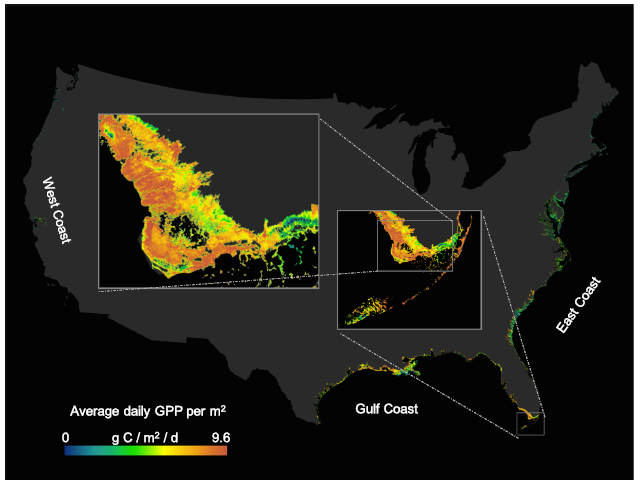Gross Primary Production Maps of Tidal Wetlands across Conterminous USA, 2000-2019
This dataset from the Carbon Monitoring System (CMS) provides mapped tidal wetland gross primary production (GPP) estimates (g C/m2/day) derived from multiple wetland types at 250 m resolution across the conterminous USA at 16-day intervals from March 5, 2000 through November 17, 2019. GPP was derived with the spatially explicit Blue Carbon (BC) model, which combined tidal wetland cover and field-based eddy covariance (EC) tower GPP data into a single Bayesian framework along with Moderate Resolution Imaging Spectroradiometer (MODIS) Enhanced Vegetation Index (EVI) datasets. For the model development, tidal wetlands were grouped into four classes: woody mangroves, woody freshwater swamps, herbaceous salt marshes, and herbaceous freshwater wetlands. The Bayesian framework required the development of Light Use Efficiency (LUE) equations specific to these tidal wetland classes as well as optimizing ED-derived GPP. Tidal wetland-based carbon, or "blue carbon," is a valued resource that is increasingly important for restoration and conservation purposes and is a critical component of global climate regulation.
NASA's CMS program is designed to make significant contributions in characterizing, quantifying, understanding, and predicting the evolution of global carbon sources and sinks through improved monitoring of carbon stocks and fluxes. The System uses NASA satellite observations and modeling/analysis capabilities to establish the accuracy, quantitative uncertainties, and utility of products for supporting national and international policy, regulatory, and management activities. CMS data products are designed to inform near-term policy development and planning.
Additional data from the CMS program and other relevant links can be found on the ORNL DAAC's CMS Project Page.
Data Citation: Feagin, R.A., I. Forbrich, T.P. Huff, J.G. Barr, J. Ruiz-plancarte, J.D Fuentes, R.G. Najjar, R. Vargas, A. Vazquez-lule, L. Windham-Myers, K. Kroeger, E.J. Ward, G.W. Moore, M. Leclerc, K.W. Krauss, C.L. Stagg, M. Alber, S.H. Knox, K.V.R. Schafer, T.S. Bianchi, J.A. Hutchings, H.B. Nahrawi, A. Noormets, B. Mitra, A. Jaimes, A.L. Hinson, B. Bergamaschi, J. King, and G. Miao. 2020. Gross Primary Production Maps of Tidal Wetlands across Conterminous USA, 2000-2019. ORNL DAAC, Oak Ridge, Tennessee, USA. https://doi.org/10.3334/ORNLDAAC/1792

